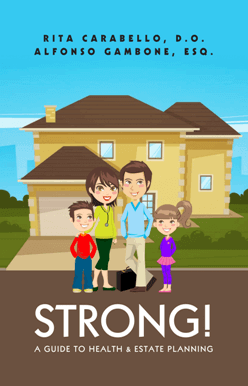Asset Transfers, Long Term Care & Medicaid Recovery

Many of our clients ask if simply transferring assets prior to death is a proper strategy to avoid paying inheritance taxes and the answer is—it depends. In Pennsylvania, transferring an asset within one (1) year of death won’t decrease the amount of inheritance tax owed on it. The Commonwealth assumes that you made the transfer in preparation of your death because of a terminal illness, a condition, or simply very advanced age. There are also specific rules regarding asset transfers and long term care. Asset transfers, however, don’t always involve death. This is just one of the topics discussed in my free book-Strong.
Nursing Homes and Asset Transfers
A loved one’s entry into a nursing home is often difficult. Prior to this event many make gifts to children and grandchildren to assist with education or maybe the start of a new business. Nursing home care is expensive and these facilities therefore require a family to disclose a loved one’s assets and recent transfers as a prerequisite for admissions. Even our most financially stable clients find that the cost of care exceeds their assets. In these situations, a family will make an application to Medicaid for assistance. Medicaid is a government assistance program. To qualify for Medicaid, the government requires that one’s assets not exceed $2,000.00. Prior to the Deficit Reduction Act of 2005 (DRA), the government would review any asset transfers made within 36 months of the application. The government presumed that any transfers for less than full value within this 36 month “look back” window were gifts, made at least in part, for the purpose of qualifying for medical assistance. Unless a family could establish that the gift was made exclusively for a purpose other than to qualify for medical assistance or an undue hardship, the government imposed a period of ineligibility on the person.
5 Year Look Back Period
This period would continue until the value of the transferred asset(s) equaled the cost of the nursing facility’s care for that period. The DRA now imposes a 60 month or “5 year look back” window on these transfers. One goal of the DRA is to encourage middle-class baby-boomers to purchase long-term care insurance through Pennsylvania’s Partnership Program. Individuals who purchase long-term care insurance policies that meet specific requirements can qualify for Medicaid without spending down their assets to $2,000.00. Here is an example. Mrs. Smith gives $25,000 to her two children on their respective birthdays in 2006 ($50,000.00). She enters a nursing home on November 1, 2008. She pays her nursing home care privately for two years until November 1, 2010 (approximately $200,000) and exhausts her assets. The total gifts of $50,000 are within the five-year look-back. The penalty period starts at the time she runs out of money and is otherwise eligible for Medicaid. The average cost of nursing home care in Smith’s area is $6,757.67 and so she becomes ineligible for Medicaid for approximately 7.4 months. If her children aren’t in a position to return the $50,000, Smith wouldn’t qualify for Medicaid until after the period of ineligibility ended.
Children Reponsible For Nursing Home Care?
While the nursing home can’t discharge Smith without a safe discharge plan, in Pennsylvania, the nursing home can hold the family responsible for the cost of the care if three (3) elements exist: (1) the parent is indigent; (2) the child has sufficient ability to support the parent; and (3) the child isn’t protected by some other law. In many situations, the law protects the family from financial responsibility. It provides that once a resident qualifies for Medicaid, a nursing home must accept Medicaid as payment services. There are many cases, however, where a family neglects to complete a Medicaid application and they can’t enjoy this protection. Given these considerations, it’s important to speak to your attorney about your estate plan and asset transfers. The failure to properly plan now could have serious consequences later.


